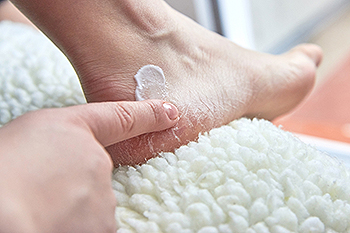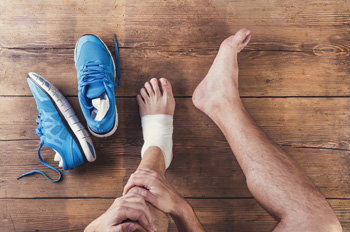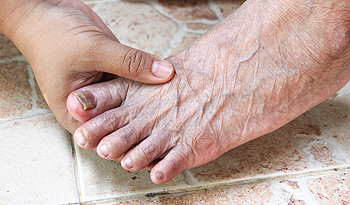Items filtered by date: February 2022
What to Do for Cracked Heels
 Heel fissures, also known as cracked heels, are the result of splitting and cracking on the skin of the heel. As the skin on the heel dries out, it loses its strength and elasticity, and it gets hard, dry, and flaky. Cracked heels can have a variety of causes that include standing for long periods of time, wearing shoes that don’t fit correctly, cold/dry weather, or obesity. If you are struggling with dry and cracked heels, applying moisturizer to the heels is the first key step in dealing with the situation. It is also important to use a pumice stone and/or liquid bandage on the affected area as well as avoiding harsh soaps and long harsh showers. In severe cases, cracked heels may require the help of a podiatrist who can help remove dead skin, prescribe stronger medicine, prescribe antibiotics, and suggest shoe inserts or heel pads. Therefore, if you are struggling with cracked heels don’t hesitate to visit a podiatrist for treatment recommendations.
Heel fissures, also known as cracked heels, are the result of splitting and cracking on the skin of the heel. As the skin on the heel dries out, it loses its strength and elasticity, and it gets hard, dry, and flaky. Cracked heels can have a variety of causes that include standing for long periods of time, wearing shoes that don’t fit correctly, cold/dry weather, or obesity. If you are struggling with dry and cracked heels, applying moisturizer to the heels is the first key step in dealing with the situation. It is also important to use a pumice stone and/or liquid bandage on the affected area as well as avoiding harsh soaps and long harsh showers. In severe cases, cracked heels may require the help of a podiatrist who can help remove dead skin, prescribe stronger medicine, prescribe antibiotics, and suggest shoe inserts or heel pads. Therefore, if you are struggling with cracked heels don’t hesitate to visit a podiatrist for treatment recommendations.
Cracked heels are unsightly and can cause further damage to your shoes and feet. If you have any concerns, contact one of our podiatrists from Summit Podiatry. Our doctors can provide the care you need to keep you pain-free and on your feet.
Cracked Heels
Cracked heels appear unappealing and can make it harder for you walk around in sandals. Aside from looking unpleasant, cracked heels can also tear stockings, socks, and wear out your shoes. There are several methods to help restore a cracked heel and prevent further damage.
How Do You Get Them?
Dry skin is the number one culprit in creating cracked heels. Many athletes, walkers, joggers, and even swimmers suffer from cracked heels. Age and skin oil production play a role to getting cracked heels as well.
Promote Healing
Over the counter medicines can help, especially for those that need instant relief or who suffer from chronic dry feet.
Wear Socks – Wearing socks with medicated creams helps lock in moisture.
Moisturizers – Applying both day and night will help alleviate dryness which causes cracking.
Pumice Stones – These exfoliate and remove dead skin, which allows for smoother moisturizer application and better absorption into the skin.
Change in Diet
Eating healthy with a well-balanced diet will give the skin a fresh and radiant look. Your body responds to the kinds of food you ingest. Omega-3 fatty acids and zinc supplements can also revitalize skin tissue.
Most importantly, seek professional help if unsure how to proceed in treating cracked heels. A podiatrist will help you with any questions or information needed.
If you have any questions, please feel free to contact one of our offices located in Wilmington, Whiteville, and Wallace, NC . We offer the newest diagnostic and treatment technologies for all your foot care needs.
Sinus Tarsi Syndrome
 Sinus tarsi syndrome (STS) is a condition that causes pain along the outside of the foot, underneath the ankle. STS is thought to be caused by an unstable subtalar foot joint, brought about by recurrent ankle sprains and trauma. It is particularly common in athletes who play sports that require a lot of jumping, such as basketball or volleyball. In addition to pain on the outside of the foot, people with STS may also experience swelling, tenderness, and a feeling of instability in the subtalar joint. A podiatrist can diagnose STS through taking your medical history and completing a thorough physical examination. Imaging studies, such as an X-ray, ultrasound, or MRI, may be needed to confirm the diagnosis and see the extent of the injury. If you are suffering from foot or ankle pain, don’t hesitate to schedule an appointment with a podiatrist near you.
Sinus tarsi syndrome (STS) is a condition that causes pain along the outside of the foot, underneath the ankle. STS is thought to be caused by an unstable subtalar foot joint, brought about by recurrent ankle sprains and trauma. It is particularly common in athletes who play sports that require a lot of jumping, such as basketball or volleyball. In addition to pain on the outside of the foot, people with STS may also experience swelling, tenderness, and a feeling of instability in the subtalar joint. A podiatrist can diagnose STS through taking your medical history and completing a thorough physical examination. Imaging studies, such as an X-ray, ultrasound, or MRI, may be needed to confirm the diagnosis and see the extent of the injury. If you are suffering from foot or ankle pain, don’t hesitate to schedule an appointment with a podiatrist near you.
Ankle pain can be caused by a number of problems and may be potentially serious. If you have ankle pain, consult with one of our podiatrists from Summit Podiatry. Our doctors will assess your condition and provide you with quality foot and ankle treatment.
Ankle pain is any condition that causes pain in the ankle. Due to the fact that the ankle consists of tendons, muscles, bones, and ligaments, ankle pain can come from a number of different conditions.
Causes
The most common causes of ankle pain include:
- Types of arthritis (rheumatoid, osteoarthritis, and gout)
- Ankle sprains
- Broken ankles
- Achilles tendinitis
- Achilles tendon rupture
- Stress fractures
- Bursitis
- Tarsal tunnel syndrome
- Plantar fasciitis
Symptoms
Symptoms of ankle injury vary based upon the condition. Pain may include general pain and discomfort, swelling, aching, redness, bruising, burning or stabbing sensations, and/or loss of sensation.
Diagnosis
Due to the wide variety of potential causes of ankle pain, podiatrists will utilize a number of different methods to properly diagnose ankle pain. This can include asking for personal and family medical histories and of any recent injuries. Further diagnosis may include sensation tests, a physical examination, and potentially x-rays or other imaging tests.
Treatment
Just as the range of causes varies widely, so do treatments. Some more common treatments are rest, ice packs, keeping pressure off the foot, orthotics and braces, medication for inflammation and pain, and surgery.
If you have any questions, please feel free to contact one of our offices located in Wilmington, Whiteville, and Wallace, NC . We offer the newest diagnostic and treatment technologies for all your foot care needs.
Healthy Weight Equals Happy Feet
 Individuals with a body mass index (BMI) that is more than 30 are considered to be obese. Obesity is believed to go hand in hand with certain foot disorders such as heel pain, tendonitis, arthritis, and other conditions caused from the stress of excess weight placed on the feet and ankles. Obesity can also put a person at risk for type II diabetes, which often leads to the development of other foot conditions. Losing weight can help reduce excess pressure on the feet and ankles, however exercising can be difficult when your feet are in pain. A podiatrist can treat foot conditions brought on by obesity and help alleviate foot pain by suggesting specific stretches and prescribing custom orthotics.
Individuals with a body mass index (BMI) that is more than 30 are considered to be obese. Obesity is believed to go hand in hand with certain foot disorders such as heel pain, tendonitis, arthritis, and other conditions caused from the stress of excess weight placed on the feet and ankles. Obesity can also put a person at risk for type II diabetes, which often leads to the development of other foot conditions. Losing weight can help reduce excess pressure on the feet and ankles, however exercising can be difficult when your feet are in pain. A podiatrist can treat foot conditions brought on by obesity and help alleviate foot pain by suggesting specific stretches and prescribing custom orthotics.
Obesity has become very problematic at this point in time and can have extremely negative effects on the feet. If you’re an obese individual and are concerned about your feet, contact one of our podiatrists from Summit Podiatry. Our doctors can provide the care you need to keep you pain-free and on your feet.
Obesity and Your Feet
Since your feet are what support your entire weight when standing, any additional weight can result in pain and swelling. Being overweight is one of the main contributors to foot complications.
Problems & Complications
Extra Weight – Even putting on just a few extra pounds could create serious complications for your feet. As your weight increases, your balance and body will shift, creating new stresses on your feet. This uneven weight distribution can cause pain, even while doing the simplest tasks, such as walking.
Diabetes – People who are overweight are at serious risk of developing type-2 diabetes, which has a drastic impact on the health of your feet. As you get older, your diabetes might worsen, which could lead to loss of feeling in your feet, sores, and bruises. You could also become more prone to various infections.
Plantar fasciitis – Pressure and stress that is placed on muscles, joints, and tendons can trigger plantar fasciitis, which is an inflammation of tissue that forms along the bottom of the foot.
If you have any questions please feel free to contact one of our offices located in Wilmington, Whiteville, and Wallace, NC . We offer the newest diagnostic and treatment technologies for all your foot and ankle needs.
Wounds That Don't Heal Need to Be Checked
The Importance of Foot Checkups for Older Adults
 Taking care of your foot health is important at any stage of your life but becomes increasingly important with age. Older adults are more likely to have medical conditions that affect their feet, such as diabetes, poor circulation, neuropathy, or arthritis, and may also be at an increased risk of foot injuries, deformity, weakness, and pain. Poor foot health is often associated with a decrease in quality of life and lower independence in completing activities of daily living. Unfortunately, the feet are sometimes neglected when it comes to regular checkups. If you are an older adult, ignoring your feet could lead to problems. It is suggested that you consult with a podiatrist regularly to monitor your foot health and treat any existing conditions.
Taking care of your foot health is important at any stage of your life but becomes increasingly important with age. Older adults are more likely to have medical conditions that affect their feet, such as diabetes, poor circulation, neuropathy, or arthritis, and may also be at an increased risk of foot injuries, deformity, weakness, and pain. Poor foot health is often associated with a decrease in quality of life and lower independence in completing activities of daily living. Unfortunately, the feet are sometimes neglected when it comes to regular checkups. If you are an older adult, ignoring your feet could lead to problems. It is suggested that you consult with a podiatrist regularly to monitor your foot health and treat any existing conditions.
If you need your feet checked, contact one of our podiatrists of Summit Podiatry. Our doctors will attend to all of your foot and ankle needs and provide you with quality treatment.
Geriatrics and Podiatry
When people age, some common issues that may occur are bone density loss, dry skin, poor circulation, and rough brittle nails. These issues may also affect your foot health if the necessary steps are not taken to alleviate the problems.
It is important to take care of your feet because feet that are injured or diseased can affect your overall health. Having painful feet hinders your ability to do daily activities or may decrease your willingness to do the things that you need to do.
Visiting Your Geriatrician
As we age, health problems become more likely, so it is essential to visit your doctor for check-ups to ensure that you are doing the best you can to take care of your health. It is recommended to check your feet frequently for any possible cuts, bruises, swelling, corns or any other irregularities.
Taking Care of Elderly Feet
Cracked or dry feet can be treated by applying moisturizer often. It is also important not to wear old socks because the older the sock is, the higher the possibility there will be that there is bacteria there. Wear fresh socks and make sure they fit properly.
Proper foot health means that you can have a more active lifestyle and you will not be bogged down by pain. Foot health also leads to good circulation, which is paramount for overall health.
If you have any questions, please feel free to contact one of our offices located in Wilmington, Whiteville, and Wallace, NC . We offer the newest diagnostic tools and technology to treat your foot and ankle needs.

